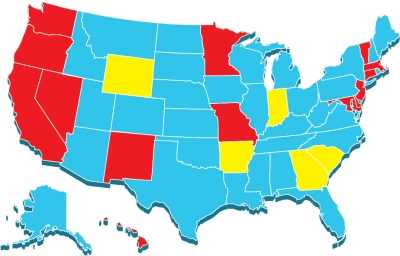Alli B. Westbrook
aw263116@ohio.edu
Does "www" stand for "World Wide Web" or "Wild Wild West" because on some days it is difficult to tell the difference. The internet is a seemingly lawless place that everybody roams. It is home to many unsavory characters who take advantage of their freedom of expression to make life harder for others who they consider outside the norm. Hate speech is an extremely pervasive issue that has rooted itself deep within internet culture.
The internet shares the same first amendment protections as press. But when discussing policy there are distinct differences between the internet and traditional media that are not typically taken into account. Those differences are centered around the internet's ability to amplify messages to mass audiences in a way that has never been seen before while also targeting individuals on a personal level. This, paired with its accessibility and ease makes it both an empowering and suppressive force.
The internet is now a place that traditional forms of media call home. Which means that traditional codes of ethics are finding their way onto new platforms. But, when policy fails ethics can only do so much. Especially considering only media professionals are directly educated on the importance of ethical codes. There needs to be a national movement that focuses on media literacy. This movement should have a campaign that directly targets hate speech through the use of codes of ethics. Similarly to how children learn about bullying in elementary, hate speech needs to be confronted.
When we are young, we are told not to bully. When we become teenagers we begin forming our identity. At the same time we gain more autonomy and freedom over our online presence. This all occurs without a consistent message or code to guide us. Through exploration many become exposed to toxic images and rhetoric. Bullying does not cut it anymore, it needs to be named for what it is, Hate speech.
Hate speech has contributed to some of America's worst atrocities. In 2019 the El Paso shooter posted hate speech on social media shortly before committing a mass shooting targeting people of Mexican ethnicity. Unlike the El Paso shooter, many are embolden by anonymity. The American Civil Liberties Union notes that anonymity is a fundamental component of our right to free speech. The Supreme Court stated in McIntyre V. Ohio Elections Commission that "Anonymity is a shield from the tyranny of the majority (ACLU, 2020).
In many cases the lines blur and it seems as if hate speech is being being protected instead of free speech. Facebook CEO Mark Zuckerburg committed to leaving potentially harmful content on its platform even if it goes against individual standards as long as Facebook deems it newsworthy (Marcy Gordon, 2019). Which once again illustrates the need for a standard of ethics.
A national movement against hate speech and for greater media literacy would increase the safety of public spaces and the quality of life for many Americans. Policy will one day catch up and we may see stricter regulations against this insidious issue that affects the mental health and physical well being of many.

@ADL "Fighting hate for good"
- States (including D.C.) with comprehensive hate crime laws that cover: race, religion, ethnicity/ national origin, sexual orientation, gender, gender identity, and disability.
- States without comprehensive hate crimes laws.
- States with no hate crimes laws.
Wonderful post, Alli! I definitely agree that anonymity has fueled an increase in hate speech online. The part you wrote about how the lines blur and it seems like hate speech is being projected instead of free speech reminds me of something I learned in my communication law class: the remedy is more speech, not less. While I personally think that hate speech should always be removed from platforms at the very least, I also understand that (in the worst case scenario) the regulation of speech could also be enforced upon speech that is critical of those opposed to hate speech. However, I do not think it is in any way ethical to rely on individuals to drown out hate when that speech doesn't have the ability to bring targeted individuals safety or justice.
ReplyDeleteHi Alli!
ReplyDeleteI really enjoyed your post. I also agree that anonymity is the driving force behind hate speech. I agree how you pointed out how media has, in a way, created a space that makes it easy for hate speech to appear. I personally do not think hate speech belongs anywhere in this world let alone media. However, I understand the concern of restricting or regulating certain speech being harmful in and of itself. In my opinion it is important that we call hate speech out for what it is and work together to remove all hate speech, most notably from media outlets.